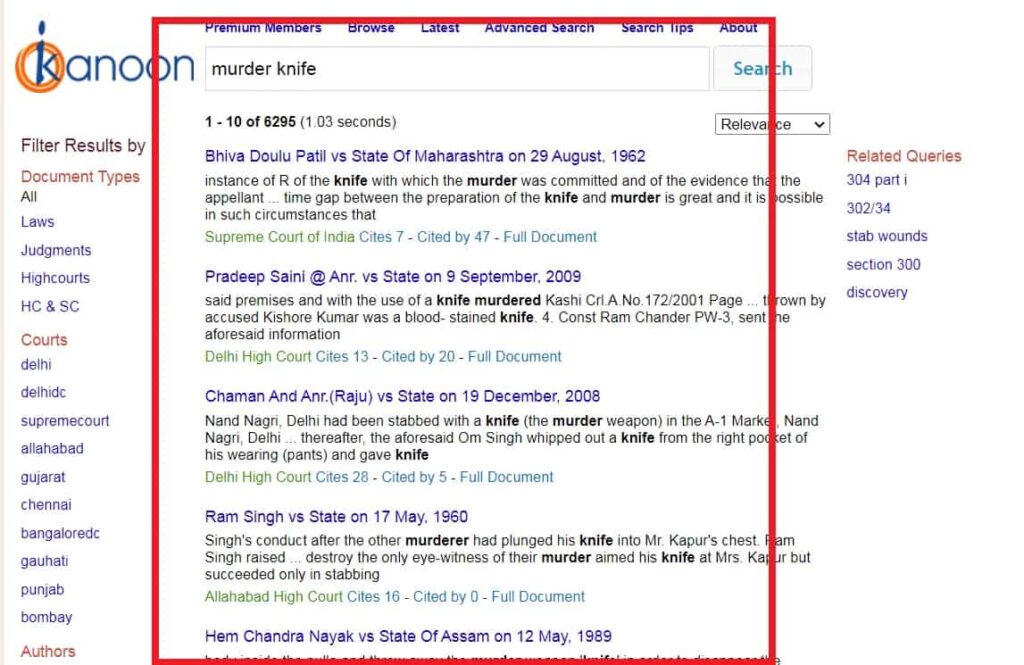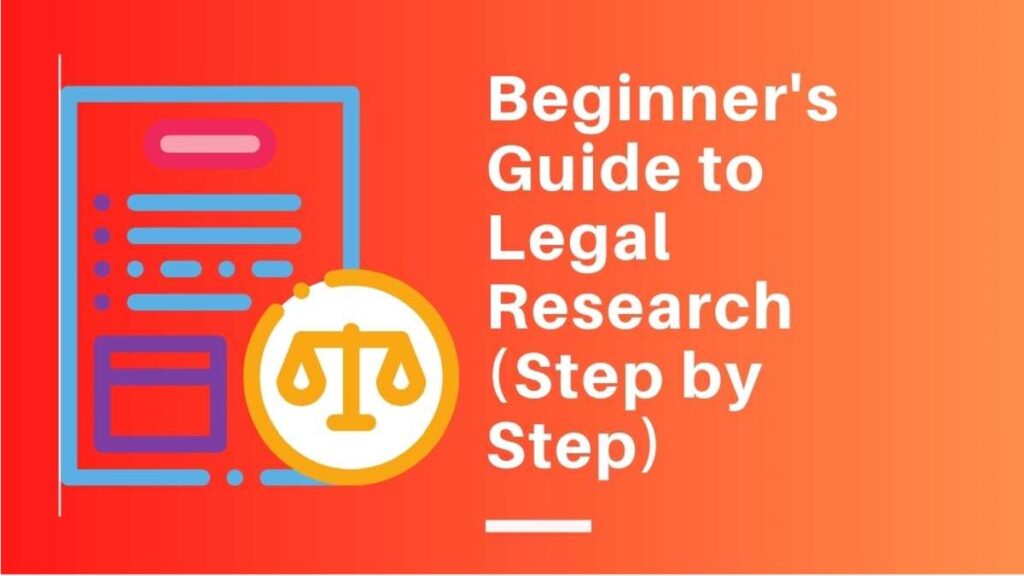The legal research methodology is a process to find answers to a legal question. It is about learning and understanding the laws, interpreting the basic principles and on that basis forming an opinion. Right from law students to experienced lawyers, everybody spends most of their time on legal research.
In this article, we will learn the basics of legal research, method, meanings, and principles. This will be a step by step method that will help any person irrespective of law background to find the answers to their legal queries.
Since, this blog is being posted on a community that has law students as majority, I’d base this with examples that will help them understand this guide in a better way. However, as stated earlier this Step by step guide will help anybody do their legal research.
The Problem
Suppose, one of our clients reaches out to us and asks us to take up a case relating to the offense of alleged murder against him. We are left with hundreds of bare acts, thousands of sections, and over a million case laws. How do we scroll through all of them and find out the relevant information to base our arguments on?
Remember, the No. 1 rule to win a case at the courtroom is to be able to tell the judge the facts of the case, the issues raised and the remedy you’re seeking. If the person does not know what cause he’s fighting and what remedy he seeks, no court in the world can decide a case.
Analyse the legal problem
The foundation of legal research is to know your question. Once we know the problem, it would be much easier to find the solution. The first step should be to sit down and write the facts of the case, even the immaterial facts. For example, the age of our client could be an important defense if he’s Doli Incapex i.e below 7 years of age. Or if he is mentally ill, other defenses under IPC protecting such persons could probably be applied.
We may ask ourselves the below questions to understand the problem better.
What are the general areas of law involved?
In the case of murder, the area of law that is involved is criminal law. As we know criminal law is a very broad subject so let’s say, the areas of law that we need to study to find the solution to our problem is the subject: Offenses against the human body.
What relief is sought?
As stated earlier, if we are not sure what relief we are seeking from the court, it would be impossible for the court to grant. Certainty is what one should seek.
In our problem, since our client has been named in a case of alleged murder, the remedy we seek is for the state to drop the case and pronounce our client as a clean man. In addition, if the person alleging the murder has misled the court into believing that our client has murdered or produces fake evidences, or has filed a case believing it to be false already then what we should seek is punishment for such offences.
What stage of legal proceeding?
The next important factor is to ascertain at what point are we seeking the remedy? I mean has the case against our client for alleged murder already been filed and sentenced or is it still at the charge-sheet stage? Are we attending a trial or making an appeal? These are important considerations at the initial stages for legal research.
What are the relevant jurisdiction?
Jurisdiction plays a major role in finding the answers to legal question. It doesn’t matter how good your argument is…if you are filing it at the wrong court, you’re wasting the time and probably losing your case. Jurisdiction isn’t always just a question that you need to answer at the court but at times an argument you need to fight. There must be some substantial reason why you’re moving a particular court and not another court.
Fighting jurisdiction is an art and you will have to be an artist at it.
In our case, the alleged murder and residence of both the victim and the alleged lawbreaker were in Delhi. Since this was an appeal case, our appeal lies at the High Court of Delhi in accordance with the established procedure of appeals in criminal matters.
What are the legal issues involved?
Legal issues refer to the point disputed by parties in a lawsuit. In this case, the point disputed is whether our client has committed the said murder and if the petitioner has sufficient evidence to support the claim and ask for a conviction at the court of law?
We may also have a look at the Writ Jurisdictions and if our case needs filing a writ petition. Suppose, if our client is under police detention already, we may have to file a Writ petition to seek remedy for such illegal arrest.
Basic research plan
After we have analysed our legal problem, the next step in legal research would be to find the relevant places where we could potentially answer our problems.
Background reading
This step involves reading and understanding the secondary sources of legal research namely books, journals, and research papers. We should start up with secondary materials such as books, journals, and papers instead of Bare Acts directly because this will give us a base to stand on. These secondary sources are mostly self-explanatory and better than bare acts to understand the law at the initial stage.
Find legislation that apply
Once we have a basic understanding of our subjects from the secondary sources, we must have learned enough to figure out the statutory legislations that apply. In our case, it is much easier since murder is a topic that we have all discussed and studied while in law school.
Finding relevant legislations could be a little tricky when the question of law relates to some lesser-known areas such as crime against the environment or say water pollution. In that case, we’d have to study the secondary sources and at times supplement our research with tools such as the basic google search or premium search engines like Manupatra to figure out that Acts such as the water (prevention and control of pollution) act, 1974, The Environment (Protection) Act, 1986 applies to our case problem.
Do not forget to check for recent amendments and state laws.
Find sections that apply
The next logical step after figuring our what legislation applies would be to figure out what section applies to our case. The Indian penal code coupled with the evidence act and procedure code runs into thousands of sections. It’s not possible to read each of these sections and figure out what applies rather, we take a much smarter step.
Look for the index:

The index will tell you the details of the chapter and the sections that fall within in a brief. So you can go through them and read only those you think might have a chance in deciding your case and forming arguments for.
In our case of alleged murder, Chapter 14 of the Indian Penal Code (Offences against human body), chapter 2 IPC ( general exceptions) and other similar chapters and sections may apply. Apart from the substantive law, a few sections from the evidence Act and the CRPC may help us form our informed arguments.
Interpret the sections in their current meaning
Law as we know changes with time and with the change in society, therefore, new amendments and judgements regularly update law. It is important we do not frame our arguments or form our opinions on the basis of these outdated laws. Therefore, we have to interpret the laws in the meaning they are currently enforced.
If we are not certain about interpreting a particular section we may take the internal aid i.e the definitions sections, explanations, provisios, and illustrations, and also resort to external aids such as judgments of the High Courts and Supreme Court to understand the provisions better.
For example:
The exception I to section 300 IPC states that “Culpable homicide is not murder if the offender, whilst deprived of the power of self-control by grave and sudden provocation, causes the death of the person who gave the provocation or causes the death of any other person by mistake or accident.”
To interpret this provision we have to know what the law means by the words “grave and sudden provocation”, “mistake or accident”. Does the Act define these words? If not are there any case laws defining these words? if yes, in what context were these words defined?
If a penal provision applies, try to find exceptions to that provision or an argument that invokes a reasonable doubt that such provisions shouldn’t apply to your case. Defend because it is your responsibility but not unethically, of course.
“Truth doesn’t always win at the court but what wins at the court is the truth!”
Interpret the sections lawfully
There’s a difference between how a lawyer interprets a provision from a bare Act and how a non-legal person interprets it. For that we may have to dive into the subject of Interprtation of statutes but here’s some basic tips to follow:
Carefully notice these words and circle them to that its easier to interpret the statute in the meaning it is originally written:
- Means
- Includes
- And
- Shall
- May
- Or
- Except
- Excluding
- Notwithstanding
The words are used in the statues in a much different way than in other texts so its important to interpret them in their true meaning to get the best out of your legal research.
Use case laws
Case laws are persuasive most of the time but at times can bind the court. One relevant case law can provide you with a reasonable standing ground in the courtroom.
- Use Case laws to support your proposition.
- Distinguish or dismiss the case laws that don’t support your proposition.
- Use case laws from another jurisdiction that support your argument. But preferably that has the same legal system. For example, UK and India have a very common legal system.
But the question remains, How do you find relevant case laws?
It’s not an easy task but not too difficult either. Your legal research mostly depends on this step. While you read from your secondary sources, keep marking relevant citations, or note them down on another piece of paper so that you can refer to it later on. Another practice would be to find them online, free tools such as IndianKanoon or premium tools such as Manupatra

FAQ
Secondary sources such as treaties, journals, commentaries, law reviews, books, and digests give you a more broad view of the subject of law concerned than the direct Bare Act. Its recommended to first start with the secondary sources and then support your understanding with primary sources such as Bare Acts, rules prescribed and orders, etc.
Citations from secondary sources such as books, journals, law reviews, commentaries and digests, practice guides and etc have a limited persuasive value when you’re citing them and at a time can even be cited during the arguments in a courtroom but they are generally not considered Authorative.
Legal research can be started online but eventually, you will have to reach out to more authoritative sources that can be relied upon when you’re seeking a legal opinion that is constructive and true. Therefore, legal research just on online resources may not prove to be much effective.
It must be noted that Wikipedia is an open platform and anybody can contribute to it. For this reason, Wikipedia must not be used for citations in legal research. It may be used to get a general overview of any subject.
There are many for example IndianKanoon is great for the free tool,
In short, the steps would be:
1. Analyse the legal problem
2. Chalk out a basic research plan
3. Find Authoritative sources and cite them supplementing your opinions.
4. Find the case laws to support your proposition.
5. Try to look for faults in your research.

Passionate about using the law to make a difference in people’s lives. An Advocate by profession.





